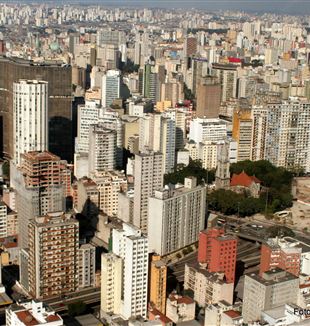
The Most Beautiful Aspect of Our Friendship
Some atheist students were struck by their teacher, and wanted to learn about “the pillars” of the Movement. And so they cooked for the homeless of São Paolo.“The road of the Movement has three pillars.” This was how Alexandre responded to the thirst of some students who had sought him out simply because they had seen his lessons at the Medical School of the University of São Paolo, where he teaches. This was more or less a year ago. A student had stopped him and said, “I want to stay with you.” Shortly after, two others (atheists and liberal, like the first) confided in him their desire to become “more human physicians, like you. Is it something innate or can it be learned?”
Slowly, a friendship began, full of the desire to know more. Faith was the last thing on their minds. Then, one evening Alexandre told them about the Movement. The next day, they looked up “Communion and Liberation” on the Internet and went back to him. “We want to do School of Community.” Then, “We also want to give to the Common Fund, because we read that it’s important.”
So, out of the three pillars, only one was missing: charitable work. The students pushed to begin, so Alexandre told them, “You choose what to do. The important thing is to be faithful to it.” They put their heads together and came up with the possibility of helping sick elderly people at a home, thinking that this kind of service would be interesting for their studies. They talked about it for months. Alexandre sensed they were uneasy about it, but they were the ones to identify the problem. “Our idea isn’t good,” they told him. “It’s a social project based on our own self-interest. Charitable work is to learn gratuitousness. We have to keep looking.” He followed them, as he has been doing since he met them. They gave themselves some more time. “In June we came upon the need of a very elderly parish priest who had been preparing dinner for the homeless for thirty years.” This parish was only a few minutes from the university, in an upscale area of town where few people go, though, because of the “uncomfortable” presence of those guests: the homeless, mentally ill, unemployed, and immigrants.
Alexandre and the students, who numbered three a year before and now were about fifteen, began their charitable work this way, helping to prepare about one hundred and fifty meals at a time. Time and gestures are really practical: peeling pounds of potatoes and carrots, working at the stove, setting the tables, serving, cleaning, and cleaning some more.
Twenty-two-year-old Riccardo was among the first to desire charitable work. “We were told that it was necessary in order to learn gratuitousness.” He did not need to know anything else, and even now, does not add many words, saying that it is too early. “You need time to understand.” But he has already made one discovery that has shattered his former ideas. “We do not know our own nature. We are made to help others, to give ourselves.” “It is the most beautiful aspect of our friendship,” says Alexandre. “Serving together makes something happen among us. It deepens the sense of belonging.” He discovered this seeing one of them, apparently the most distant, cleaning the floor and singing Povera Voce. He also discovered it in himself. “I always did charitable work because I was following the university students. But I did it for them, so that they would do it. Now I need it for myself.”
One Saturday, Alexandre had to skip going to charitable work because of an important commitment. “A justified absence, certainly,” he says. But he heard that one of the students went another evening because he had missed once. Alexandre followed his example in order to learn the same gusto. He recounts, “This year, I realized two things: that God is more mysterious than I had thought, and that my ‘I’ is more mysterious than I had imagined. So many problems in life have this origin, the failure to understand these two mysterious facts.”